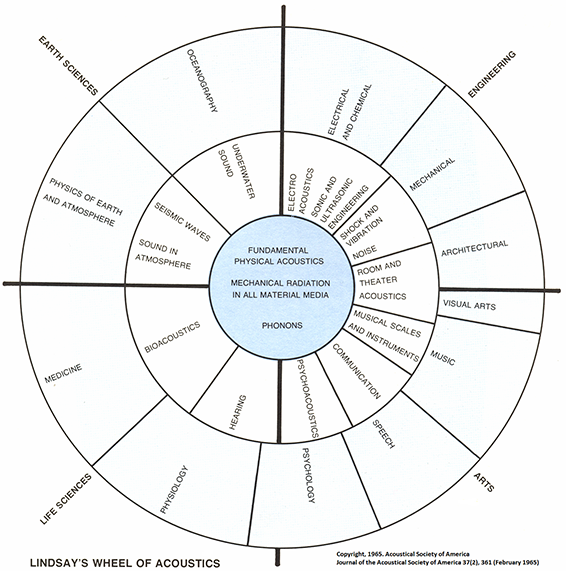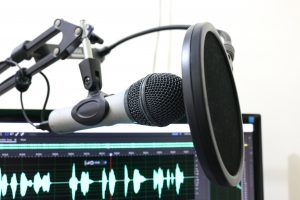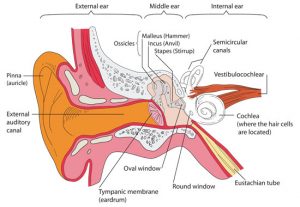Fields of Acoustics
Acousticians include engineers, physicists, speech and hearing scientists, architects, biologists, psychologists, linguists, mathematicians, oceanographers, computer scientists, and musicians. There are many different fields of acoustics for study and practice as you can see in Lindsay’s Wheel of Acoustics below.

The “Wheel of Acoustics” was created by R. Bruce Lindsay for The Science of Acoustics, published in the Journal of the Acoustical Society of America. This wheel shows the fields of acoustics starting with the four broad fields of Earth Sciences, Engineering, Life Sciences, and the Arts.
The outer circle lists the various broad disciplines one may study to prepare for a career in acoustics.
The inner circle lists the fields within acoustics to which many fields naturally lead.
You can find more information about 8 different fields of acoustics below and read about different careers in acoustics on the Meet Acousticians page.
General Acoustics

Material in this category covers the science of sound and waves. How sound is created, how it travels and how it is received. How materials react to different types of sounds is also important in this field.
This field includes Engineering Acoustics, Physical Acoustics, and Signal Processing in acoustics, and others.
Animal Bioacoustics

Animal Bioacousticians study how animals make, use and hear sounds. Animal bioacoustics also includes the use of sound to study and detect the presence of animals and their behavior, the sounds they make, the effects of man-made noise on animals, and the use of SONAR to monitor the presence of plankton and fish.
This field includes Acoustical Oceanography, Animal Bioacoustics, Underwater Acoustics, and others. Watch a video!
Architectural Acoustics

Architectural acousticians study how to design buildings and other spaces that have pleasing sound quality and safe sound levels. Architectural acoustics includes the design of concert halls, classrooms and even heating systems. They may work with musical acousticians and noise specialists. This field includes Architectural Acoustics, Engineering Acoustics, Physical Acoustics, Structrual Acoustics and Vibration, and others.
Medical Acoustics

Doctors and medical researchers study and use acoustics to diagnose and treat different types of ailments. The study of medical acoustics includes the use of ultrasound and other acoustical techniques to learn how different types of sound interact with cells, tissues, organs and entire organisms. Biomedical acousticians may work with engineers, physicians and speech therapist.
This field includes Biomedical Acoustics, Engineering Acoustics, Speech Communication, Noise, and others. Watch a video!
Musical Acoustics

Musical acousticians study the science of how music is made, travels and is heard. Since musical acoustics combines elements of art and science, people with training in this field can work in the entertainment industry, in education, in recording and film studios, in the musical instrument industry and much more.
This field includes Musical Acoustics, Physcological and Physiological Acoustics, Noise, and others.
Noise and Environmental Acoustics

Noise specialists are mostly concerned with making our world a quieter place. They study natural and man-made noise, especially from machinery and transportation, and how people respond to noise. Knowledge produced by these scientists can be used to redesign noisy machinery, or to recommend ways of shielding the noise, or to help lawmakers and public officials create rules for limiting exposure to noise.
This field includes Noise, Structural Acoustics and Vibration, Speech Communication, and others. Watch a video!
Speech and Hearing

Hearing specialists and speech scientists are interested in how our ears sense sounds, what types of sounds can damage our ears and how speech is made, travels, and is heard. People interesting in hearing and speech come from many different fields, including physics, speech and hearing science, experimental psychology, linguistics, electrical engineering, and others.
This field includes Speech Communication, Physiological and Psychological Acoustics, Noise, and others.
Underwater Acoustics

Underwater Acoustics is the study of sounds moving through water, such as the ocean, a lake or even water in a tank. Scientists in this field may study the surface of the water, deep underwater, or even close to the seabed or ocean floor.
This field includes Underwater Acoustics, Acoustical Oceanography, Animal Bioacoustics, Physical Acoustics, and others.
14 Technical Committees
Learn how these content areas fit into the 14 technical committees of ASA.
Meet Acousticians
Read about different careers in acoustics.
